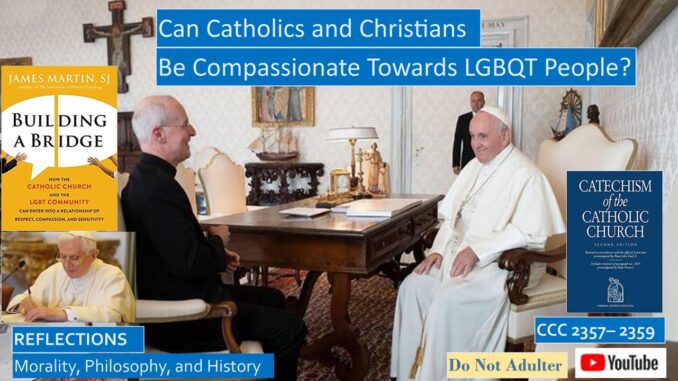
What can we learn from reflecting on the writings of the James Martin on the LGBT issues, and also Pope Benedict?
Should we be compassionate or condemning and cruel towards our LGBT neighbors?
Can we troll our way to heaven on the internet?
How comparable are the positions of Father Martin and Pope Benedict on LGBT issues?
What should be the lens through which we view LGBT issues, or any other moral issue?
Script for this video, with Amazon book links: https://www.slideshare.net/BruceStrom1/building-bridges-to-lgbt-community-father-martin-and-popes-benedict-and-francis
YouTube video: https://youtu.be/F3BmZFYlqiU
INTRODUCTION
What is the core of the Judeo-Christian tradition? Simply put, we should keep in mind the two-fold love of God and neighbor, that we should Love God with all of our heart and with all of our soul and with all of our mind and with all of our strength, and that we should love our neighbor as ourselves. This sums up the Decalogue, this sums up the teachings of both the Catholic and Lutheran Catechisms, this sums up the Jewish Torah and Talmud.
How should we interpret Holy Scripture? St Augustine teaches us that we should interpret Scripture according the two-fold Love of God and neighbor, that correct interpretations of Scripture will increase in us our Love of God and neighbor, and any verse whose literal sense appears to contradict these principles should be interpreted allegorically.
How should this two-fold Love of God and love of neighbor affect how we enforce moral laws in our faith and civil communities? When should these be enforced?
Simply put, in the Judeo-Christian tradition, they should be enforced so they increase in our hearts the two-fold Love of God and neighbor. This certainly means we should discourage sexual abuse and punish serious sexual abuse that is proven.
Certainly, it means we should seek to be compassionate rather than cruel, because compassion is loving, while cruelty is hateful.
ABOUT FATHER JAMES MARTIN
Father James Martin is a Jesuit priest who has appeared on Stephen Colbert’s Late-Night program and many other television programs. Once he was invited to appear after Glenn Beck’s suggestion that Catholics should avoid priests who teach social justice. In rebuttal, Father Martin said that social justice simply “addresses the things that keep people poor” and asks: “Why these people are poor? Christ asked us to work with the poor.
For example, in the gospel of Luke, in the Sermon on the Plain, Jesus exhorts us, “Blessed are the poor,” and to make sure you understand the message, this is paired with, “Woe to your who are rich.” The central message of many prophets in the Old Testament is to take care of the poor, the widow, the orphan, the sojourner, the immigrant.
Woke Bible verses: https://youtu.be/576TYemgA8o
Father Martin is currently the editor of the Jesuit magazine America. Soon after the 2016 Orlando nightclub shooting, he published this book, the full title is “Building a Bridge: How the Catholic Church and the LGBT Community can enter into a relationship of respect, compassion, and sensitivity.” The first chapters discuss how Christians can build a bridge to the LGBT community, and the last chapters discuss how LGBT people can better build a bridge to the church.
Father Martin is writing the book from the perspective of a Catholic priest, but since his message has universal appeal, often I will substitute the word “Christian” for “Catholic,” and also “high church officials” for bishop, but not when the substitution would confuse rather than clarify.
This picture of Pope Francis meeting with Father Martin was taken in the Vatican to encourage him in his LGBT ministry, and Pope Francis has publicly commended Father Martin in his ministry to the LGBT community.[1] Pope Francis finds himself in an insolvable quandary: he wishes to respect the teachings of the catechism on homosexuality, but he also wishes to show compassion to LGBT individuals. The problem is that if he is overly strict, then many Christians will show cruelty to LGBT individuals, the Pope wishes to be compassionate to LGBT individuals, and he does not want to exclude them from attending the Mass and from Christian fellowship.
The views of Pope Benedict differ from Father Martin. Pope Benedict first became aware of the seriousness and extent of the clerical sexual abuse scandal when he was a Cardinal in the Vatican, his experience is as a Vatican policeman, seeing the worst abuses possible where pedophile priests were abusing their young parishioners. On the other hand, Father Martin encounters the LGBT issues from the perspective of confessor and confidant of ordinary laity and priests.
Was Pope Benedict XVI proactive in the pedophile priest sex scandal? https://youtu.be/mnLveEhokWU
In his introduction, Father Martin rues that “Not too long ago, opposing factions would often interact with each other politely for the common good. Certainly, there were tensions, but a quiet courtesy and tacit respect prevailed.”
“Now all one seems to find is contempt. Many people feel powerless to prevent the continued fraying of the social fabric as well as the name-calling, personal attacks, and violence that such division gives rise to.”
“For me, the ‘echo chambers’ created by social media in which one’s worldview is barely challenged, news channels specializing in simplistic and sometimes false analyses of complicated political situations, and civic leaders seemingly unconcerned about the division that their words and actions might cause contribute to this disunity” and hateful discourse.[2] Pope Francis has echoed many of these concerns in his encyclical, Gaudete et Exsultate, where he encourages us to realize that we are messaging real, live human beings on the internet, discouraging trolling.
Pope Francis, being compassionate on the internet: https://youtu.be/jF-fsMvYsak
TEACHINGS FROM THE CATHOLIC CATECHISM
Whether you are Catholic or not, the Catholic Catechism is a good starting point when discussing moral issues. Bishops from around the world have had input in drafting both the Catechism and the Vatican II decrees that form the basis of the Catechism, it may be the most carefully edited and carefully worded document in the Christian world.
Father Martin has always emphasized that he always has and always will respect the teachings of the Catholic Church and the Catholic Catechism. We would like to emphasize that these teachings can be a good guide all Christians, and indeed, all men of all religious traditions.
CCC 2357 “Homosexuality refers to relations between men or between women who experience an exclusive or predominant sexual attraction toward persons of the same sex. It has taken a great variety of forms through the centuries and in different cultures.”
Several of the Platonic dialogues, including Plato’s Phaedrus and Symposium, as well as Xenophon’s Symposium, suggest that Socrates and Xenophon are wary of homosexuality, and in particular pederasty, or men-boy love, although they do not condemn the practice, and include some passages many interpret as being supportive.
Both the Symposium and the Phaedrus reflect the Greek culture that elevates both married love between a husband and wife and homosexual love, although the ancients would have regarded the concept of homosexual marriage as simply absurd. The purpose of marriage in the ancient world was to raise children who would keep alive the family name as well as take care of you when you are older.
Although Socrates does not condemn homosexual love in either dialogue, he seeks to rise above carnal love. Socrates is only capable of a philosophical divine love that is only concerned with the goodness of the soul. In the Symposium, the rowdy Alcibiades crashes the dinner party quite drunk, proclaiming how though he and Socrates were the best of friends, even saving his life in the thick of battle, in the end Socrates refused to become his lover.
Xenophon and Plato’s Symposium, Romantic or Carnal Love: https://youtu.be/OIe5pn2S1Ls and Divine Love: https://youtu.be/z6X3pwVTdrc
Plato’s Phaedrus: YOUTUBE
“Its psychological genesis remains largely unexplained. Basing itself on Sacred Scripture, which presents homosexual acts as acts of grave depravity, tradition has always declared that “homosexual acts are intrinsically disordered.”
Father Martin does not object to this teaching but points out that many LGBT activists object to the technical theological term “intrinsically disordered,” suggesting that a more compassionate and acceptable wording that is more acceptable. I sympathize, so I would like to posit: Good luck with that.
“They are contrary to the natural law. They close the sexual act to the gift of life. They do not proceed from a genuine affective and sexual complementarity. Under no circumstances can they be approved.”
Again, I am also sympathetic to the notion that intimacy with consequences can literally affect future generations, and can be more meaningful. The Vatican II popes are more open to a theology that celebrates marriage without procreation in Pope John Paul II’s Theology of the Body, we look forward to reflecting on the these teachings.
YOUTUBE
CCC 2358 “The number of men and women who have deep-seated homosexual tendencies is not negligible. This inclination, which is objectively disordered, constitutes for most of them a trial. They must be accepted with respect, compassion, and sensitivity. Every sign of unjust discrimination in their regard should be avoided. These persons are called to fulfill God’s will in their lives and, if they are Christians, to unite to the sacrifice of the Lord’s Cross the difficulties they may encounter from their condition.”
These are all themes that Father Martin will repeat in his reflections.
CCC 2359 “Homosexual persons are called to chastity. By the virtues of self-mastery that teach them inner freedom, at times by the support of disinterested friendship, by prayer and sacramental grace, they can and should gradually and resolutely approach Christian perfection.”
Father Martin explicitly confirms this teaching for LGBT clergy, but he does not emphasize chastity for LGBT laymen. Which is not surprising, for if you pressure anyone on issues of intimacy, often the only accomplishment is greater discretion. All of us who are in an intimate relationship have a secret life that we really would rather not share.
What needs to be discussed is what the Holy Scriptures teach us about this issue. The teachings of the medieval rabbi Maimonides, or Rambam, on intimacy are an excellent framework to discuss this, and in particular the Gospels, St Paul’s Epistles, and the Torah, or first five books of the Old Testament, and the teachings of the Church Fathers and of course, medical science. And Persona Humana, referenced in the footnotes for the Catholic Catechism.
TWO-WAY BRIDGE: RESPECT FOR LGBT PEOPLE
Father Martin observes, “Some Christians object” to any kind of outreach to LGBT Christians, saying “that any outreach implies a tacit agreement with everything that anyone in the LGBT community says or does.”
“Respect means calling a group what is asks to be called.” For example, we no longer use the term Negroes, because many prefer to be referred to as African Americans or as blacks. Also, “when Moses asks to know God’s name, God says, ‘I am who I am.’”
“Many, if not most, LGBT people have endured, from an early age, misunderstanding, prejudice, hatred, persecution, and even violence, and therefore often feel a natural compassion toward the marginalized.”
Father Martin reminds us that LGBT Christians have gifts:
- “Compassion is a gift: They have often felt unwelcome in their parishes and the church.
- Perseverance is a gift: They persevere because of their vigorous faith.
- Forgiveness is a gift: They are often forgiving of clergy and other church employees who treat them like damaged goods.”
Father Martin explains, “There are hundreds, perhaps thousands, of holy and hardworking gay clergy, and gay and lesbian members of religious orders, who live out their promises of celibacy and vows of chastity and help to build up the church.”
Father Martin reflects on the Catholic Catechism’s warnings against unjust discrimination for LGBT people, and in particular the selective firing of LGBT people from schools and church ministries. He asks: Why do we not also fire those who get divorced and remarry with an annulment? One argument is that LGBT people in a relationship continue to live in sin, but that also should apply to those who marry to cure an adulterous relationship.[3]
TWO-WAY BRIDGE: COMPASSION FOR LGBT PEOPLE
Father Martin suggests “questions Christian leaders might ask their LGBT brothers and sisters:
What was it like growing up as a gay boy, a lesbian girl, or a transgender person?
What is your life like now?
How have you suffered as a result of your orientation?”
“We must not ignore the disproportionately high rates of suicide among LGBT youths and the fact that LGBT people are the victims of proportionally more hate crimes than any other minority group in the country. The bullying of LGBT students in schools is also an evil that should be squarely opposed.”[4]
Another historical fact that we must not forget is that when Hitler started persecuting the disadvantaged groups in Germany, including the Jews, he first targeted the homosexuals of Germany knowing they would be easy targets, and then he went after the Jews and blacks and Jehovah’s Witnesses and finally, the faithful clergy who did not wish to deny the Jewishness of Jesus.
Christians keep the faith in Nazi Germany: https://youtu.be/QP9UR8fqfvs
Should we be cruel to our LGBT neighbors? If you only watch Fox News, you would be unaware of the effect this article has had in liberal circles, that argues that for Republicans, The cruelty is the point! And since most Christians are Republicans, and since most Christians view the Republican Party as the Christian Party, this means that most of our secular citizens who are turned off by organized religion do not view American Christians as Compassionate, they view Christians as CRUEL!
For many Americans, CRUELTY, NOT COMPASSION, currently defines Christianity.
Personally, I am sympathetic to many of the so-called Christian issues, but I am reluctant to support them. WHY? Because so many Christians wish to show cruelty rather than compassion to their poorer neighbors and to the disadvantaged.
https://www.theatlantic.com/ideas/archive/2018/10/the-cruelty-is-the-point/572104/
TWO-WAY BRIDGE: SENSITIVITY FOR LGBT PEOPLE
Father Martin defines “sensitivity as a heightened awareness of what might hurt or offend someone.”
“Based on my observations, many church leaders still do not know many gay and lesbian people. The temptation is to smile and say that church leaders do know people who are gay: priests and bishops who are not public about their homosexuality.”
“One common objection is to say, ‘Jesus always told them, first of all, not to sin!’ We cannot meet LGBT people because they are sinning, goes the argument, and when we do meet them, the first thing we say is, ‘STOP SINNING!’”
A counter-example is the story of Zaccheus, the tax collector who was so short he could not see Jesus from over the crowd as he passed by. To catch a glimpse, he climbed a sycamore tree, something that would embarrass most adults.
Father Martin points out, “Jesus didn’t point to him and shout, “SINNER!” Instead, Jesus says that he will dine at Zaccheus’ house, a public sign of openness and welcome, before Zacchaeus has said or done anything. Only after Jesus welcomes him is Zaccheus moved to conversion, promising to pay back anyone he might have defrauded.”
“For Jesus it is most often community first: meeting, encountering, including, and conversion second.”[5]
TWO-WAY BRIDGE: RESPECT FOR THE CLERGY
Father Martin sees the bridge between the Church and the LGBT community a two-way bridge, that not only does the Church need to improve their respect for the LGBT community, but also the LGBT community should also respect the authority of the Church. We see this in the Decalogue: What is the first commandment on loving your neighbor? Honor your father and mother, which can be expanded to respect for authority. Respect comes first, lack of respect makes love impossible.
Father Martin asks, “What would it mean for LGBT Christians to treat the institutional church with respect, compassion, and sensitivity?”
“When high church officials speak on matters like, but not confined to, love, forgiveness, and mercy, as well as caring for the poor, the marginalized, the unborn, the homeless, prisoners, refugees, and so on, they are drawing not only from the Gospels, but also from the spiritual treasury of the church’s tradition.”
“Beyond what one might call ecclesial respect, the hierarchy deserves simple human respect. Often, I’m saddened when I hear what LGBT Christians and their allies say about high church officials, publicly and privately.” Often LGBT groups will mock bishops for being in ivory towers, mock them for vows of celibacy, mock them for their clerical garbs and residences, and even mock them for their supposed repressed sexuality. Mockery is never beneficial, mockery is always slanderous, such mockery damages the reputation of both Christian leaders and the Church.[6]
TWO-WAY BRIDGE: COMPASSION FOR THE CLERGY
Father Martin bids us to “recall the definition of compassion: To experience with or suffer with.” We should simply realize that church officials have many competing demands and pressures they need to deal with.
“Compassion leads us to an ‘equality of heart,’” which means that many church leaders “may themselves be struggling. They might be homosexual men who at a younger age were tortured by the same hateful attitudes that most LGBT people experienced growing up and who entered a religious world that seemed to afford them some safety and privacy.”
He quotes from a book by Com Toibin answering the question: Why do gay men become priests?
“Becoming a priest seemingly solves the problem of not wanting others to know that you are queer. As a priest, you could be celibate or unmarried, and everyone would understand the reasons. It was because you had a vocation; you had been called by God, had been specially chosen by Him. For other boys, the idea of never having sex with a woman was something they could not even entertain. For you, such sex was problematic; thus you had no blueprint for an easy future. The prospect, on the other hand, of making a vow in holiness never to have sex with a woman offered you relief.” This vocation offered “a certain privacy, a way to serve God without having to admit one’s sexuality.” [7]
One of Pope Benedict’s solution for the clerical sexual abuse crisis was to exclude men with homosexual tendencies from seminaries. I don’t know how his views affect who is admitted into seminaries today, I do know he comes from more of a policeman’s perspective, as he has witnessed the worst cases of pedophile priests in the world. On the other hand, Father Martin has been a confidant and/or confessor to both LGBT laymen and priests. Not only does he have experience with a broader sampling of Christians, he approaches the LGBT issue with a pastoral a concern, realizing that the majority of homosexual priests are not monsters, and are, indeed, celibate.
TWO-WAY BRIDGE: SENSITIVITY TO THE CLERGY
Dr Wikipedia informs us that an American bishop who was critical of the teachings of Father Martin, emphasizes that he does not speak for the Catholic Church. Father Martin agrees! He points out that we should realize that all churches have a hierarchy, that no one clergyman speaks for the whole church, and this is true sometimes even for Pope Francis. Pope Francis likes to float ideas in his talks to reporters while flying in a plane, his plane talks are unofficial, and not binding, but his official comments in Vatican communications have higher authority, and his published encyclicals have the highest authority.
Pope Francis says this in his encyclical, Amoris Laetitia, The Joy of Love:
“We would like before all else to reaffirm that every person, regardless of sexual orientation, ought to be respected in his or her dignity and treated with consideration, while ‘every sign of unjust discrimination’ is to be carefully avoided, particularly any form of aggression or violence. Such families should be given respectful pastoral guidance, so that those who manifest a homosexual orientation can receive the assistance they need to understand and fully carry out God’s will in their lives.”[8]
Father Martin emphasizes, “’Before all else,’ the pope says, LGBT people should be treated with dignity. That’s an immense statement, and he does not mention anything about an ‘objective disorder,’” which is the technical phrase in the Catechism that so many LGBT Catholics find objectionable. “Nevertheless, among some LGBT people in this country those lines were dismissed with cries of: ‘NOT ENOUGH!’”[9]
CARDINAL RATZINGER: 1986 LETTER TO BISHOPS ON HOMOSEXUALITY
Cardinal Ratzinger, future Pope Benedict XVI, clarifies the church’s stance towards homosexuality in a 1986 Letter to the Bishops. This was long before his Vatican CDF department assumed control of disciplinary proceedings of pedophile priests in 2001, in 1986 he was likely not fully aware of the extent of clerical misbehavior.
In this letter, Cardinal Ratzinger proclaims that:
3. “Although the particular inclination of the homosexual person is not a sin, it is a more or less strong tendency ordered toward an intrinsic moral evil; and thus, the inclination itself must be seen as an objective disorder,” language which offends LGBT people.
Cardinal Ratzinger observes that both Leviticus and the Epistles of St Paul proclaim that homosexuals are excluded from the people of God. He rejects the notion that Biblical “moral injunctions are so culture-bound that they are no longer applicable to contemporary life.”
- Cardinal Ratzinger continues, “Homosexual activity is not a complementary union, able to transmit life; thwarting the call to a life of self-giving which the Gospel says is the essence of Christian living. This does not mean that homosexual persons are not often generous and giving of themselves; but when they engage in homosexual activity, they confirm within themselves a disordered sexual inclination which is essentially self-indulgent,” again using language which offends LGBT people.
- Activists who claim to represent the entire homosexual community often “protest that any and all criticism of or reservations about homosexual people, their activity and lifestyle, are simply diverse forms of unjust discrimination.” These activists seek the support of pastors to change civil laws.
Now Pope Francis is encouraging that the church should do exactly that, encouraging the legalization of homosexuality, although he is not advocating changing the moral prohibitions in the Catechism. Clearly, that is the next target for activists.
- Cardinal Ratzinger deplores violence against homosexuals, but he emphasizes this does not justify denying that the homosexual condition is disordered. He also warns that if civil legislation is passed to protect the rights of homosexuals, then “other distorted notions and practices will gain ground.”
This was an accurate prediction, indeed. We have activists who wish to promote polygamy and polyamory, which like pederasty, are deeply disordered because they invite sexual abuse.
- “Christians who are homosexual are called, as all of us are, to a chaste life.”
15. “We encourage the Bishops, then, to provide pastoral care in full accord with the teaching of the Church for homosexual persons of their dioceses. No authentic pastoral program will include organizations in which homosexual persons associate with each other without clearly stating that homosexual activity is immoral. A truly pastoral approach will appreciate the need for homosexual persons to avoid the near occasions of sin.”
Father Martin is reluctant to suggest that homosexuals should be challenged on whether their lifestyle is moral or not.
Ever the policeman, Cardinal Ratzinger concludes:
17. “All support should be withdrawn from any organizations which seek to undermine the teaching of the Church,” especially denying permission for homosexual groups to schedule religious services in Catholic churches or schools. “To some, such permission to use Church property may seem only just and charitable; but in reality, it is contradictory to the purpose for which these institutions were founded, it is misleading and often scandalous.”
Does Father Martin demur from this limitation?
What are my personal opinions?
First, we need to respect the authority of church leaders, whether that be the Pope if we are Catholic, or another church leader, or our pastor in a Congregational Church, and if we cannot respect our church leaders, we need to select a church whose leaders we respect and respect them.
If Christians are seen as cruel rather than compassionate, Christians will no longer represent virtue, and risk being influenced by the evil forces in the world.
If Christians are seen as compassionate, then they will influence the culture in a beneficial manner. If Christians are compassionate, they will also be respectful.
Letter of retired Pop Benedict XVI on root causes of sexual abuse scancal:
https://www.catholicnewsagency.com/news/41013/full-text-of-benedict-xvi-essay-the-church-and-the-scandal-of-sexual-abuse
Cardinal Ratzinger, future Pope Benedict XVI, letter to bishops
https://www.vatican.va/roman_curia/congregations/cfaith/documents/rc_con_cfaith_doc_19861001_homosexual-persons_en.html
Which clarifies this papal encyclical:
https://www.vatican.va/roman_curia/congregations/cfaith/documents/rc_con_cfaith_doc_19751229_persona-humana_en.html
[1] https://en.wikipedia.org/wiki/James_J._Martin_(priest)
[2] James Martin CJ, Building a Bridge (New York: HarperOne, 2017), pp. 6-8.
[3] James Martin CJ, Building a Bridge, pp. 20-31.
[4] James Martin CJ, Building a Bridge, pp. 32-37.
[5] James Martin CJ, Building a Bridge, pp. 40-46.
[6] James Martin CJ, Building a Bridge, pp. 48-54.
[7] James Martin CJ, Building a Bridge, pp. 56-62.
[8] https://en.wikipedia.org/wiki/James_J._Martin_(priest)
[9] James Martin CJ, Building a Bridge, pp. 67-71.

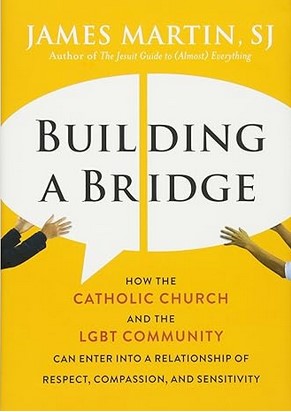
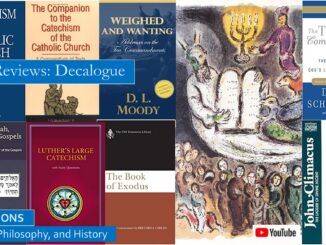
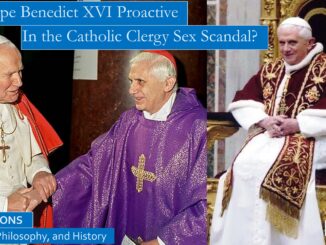
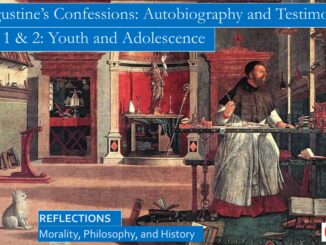
1 Trackback / Pingback